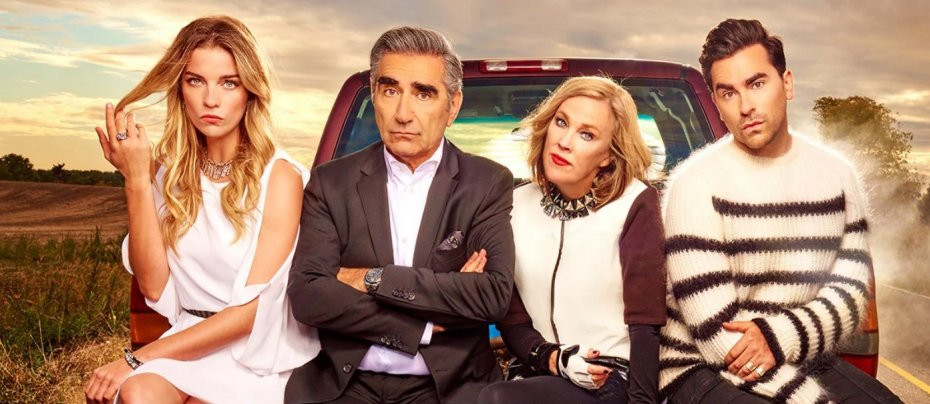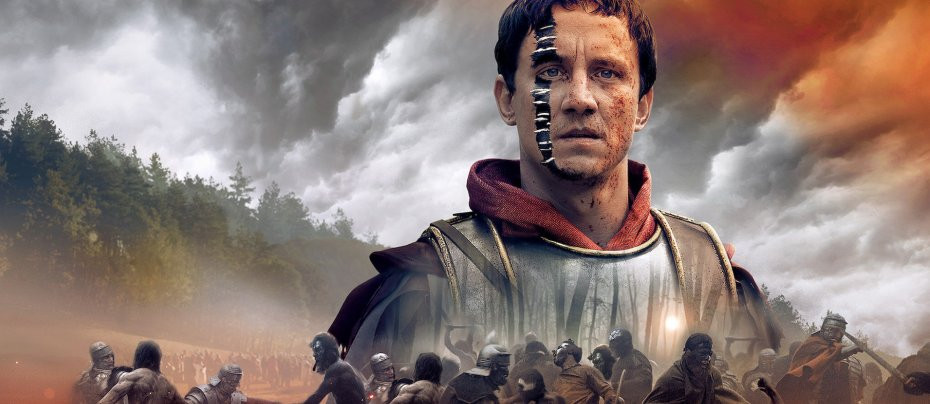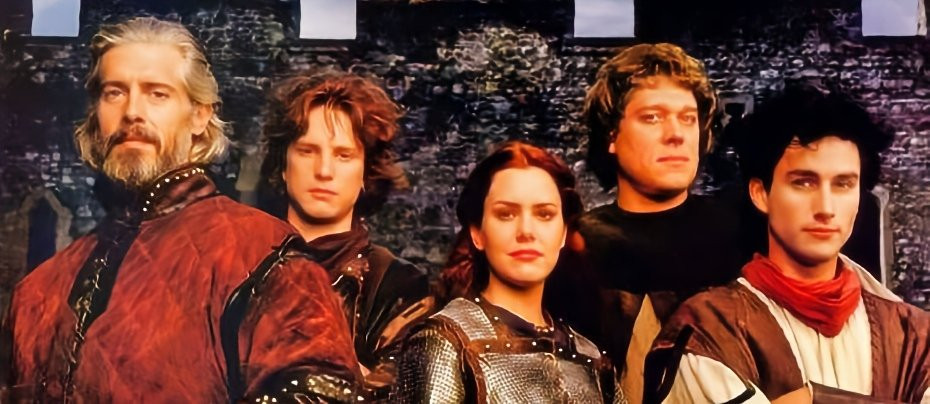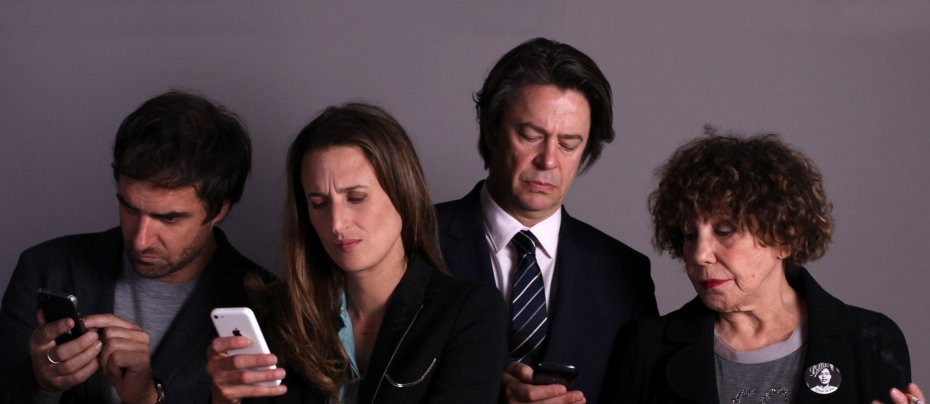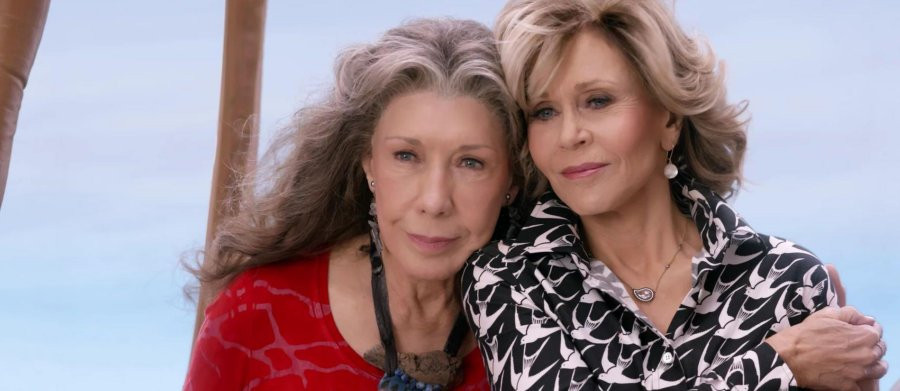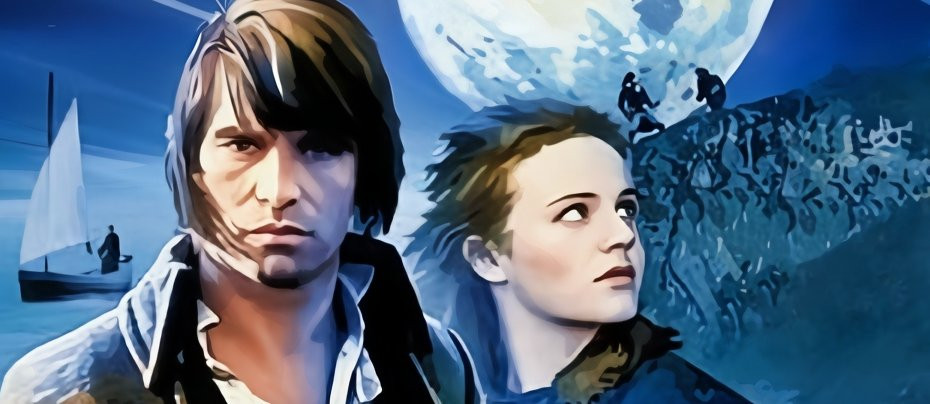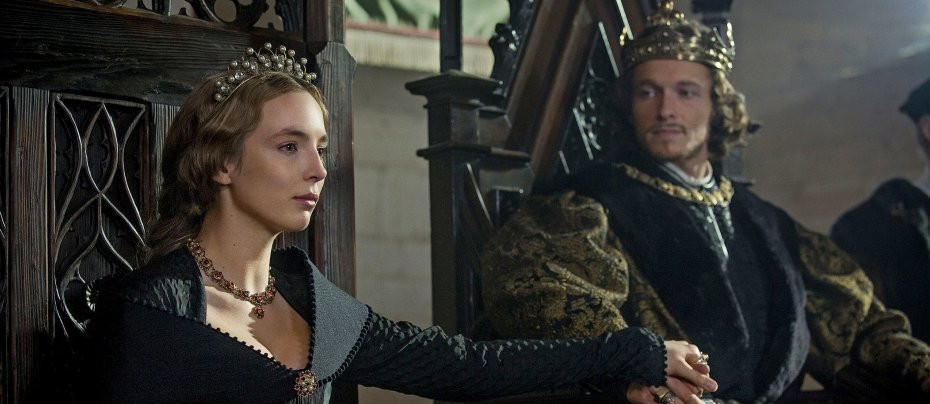
The Last Kingdom
2015 - United Kingdom“a text book example of how to do the adaptation of historical fiction well”
The Last Kingdom review by John Winterson Richards
It is no coincidence that The Last Kingdom is set mostly in the historical period immediately after the one covered rather loosely by Vikings, with some overlap in that the early years of the future Alfred the Great feature in both. The Ragnarssons are not named as such in The Last Kingdom, but it is essentially dealing with the consequences of the invasion of England by their "Great Heathen Army." Yet if The Last Kingdom seemed at first a fairly obvious attempt to imitate Vikings, and cash in on its growing popularity at that point, it soon established its own way of doing things and, when one compares the two over their entire runs, there is a strong case for saying that The Last Kingdom is, overall, the better of the two.
The main reason for this is that, while Vikings was based on a very loose version of history and Saga, The Last Kingdom is an adaptation of a series of novels by Bernard Cornwell, a writer who really understands both history and storytelling. This is not to say he is infallible - and the script plays a bit with chronology and necessarily leaves out a great deal that is historically important because it is irrelevant to the main storyline - but The Last Kingdom in accurate in its depiction of the general flow of history and in most details. Where Cornwell and the adaptors fictionalise, they are usually only filling in the gaps in the record rather than contradicting established facts.
The tight structure of Cornwell's novels also ensures that there is none of the padding that one can sometimes encounter in Vikings, especially in the later, double length seasons when the story really began to wander. Each season of The Last Kingdom has a clear plot with a beginning, a middle, and an end. There are subplots but they link to the main story and usually end up contributing to it in some way.
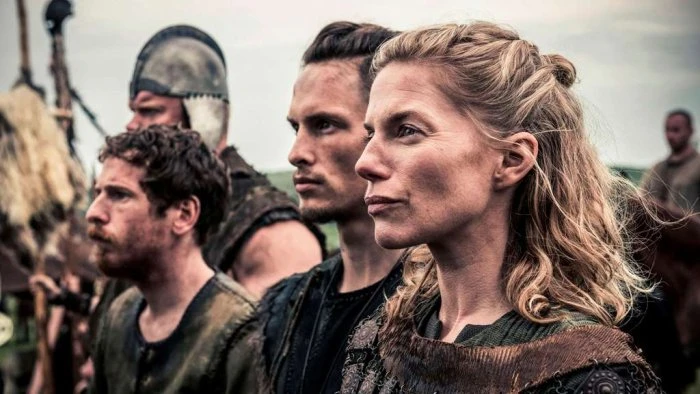
The protagonist and principal supporting characters, and even some of the secondary characters, have definite character arcs of their own within the overall story. They change and develop - and sometimes regress after they seem to be growing. Supposed villains sometimes have good instincts and even do good things, while characters who appear noble sometimes do bad things. The lines become blurred. Everyone is flawed, even our protagonist, the heroic Uhtred, and Alfred, who is sometimes truly Great but at other times not so much. These flaws lead them to make mistakes which in turn drive the story. Character determines action and action determines events. This is how it should be done.
The characters are in any case far more sympathetic than the protagonists in Vikings, who were compelling but rarely likeable. One would not want the Ragnarssons as friends, but one would quite like to hang out with Uhtred and the disparate gang that forms around him.
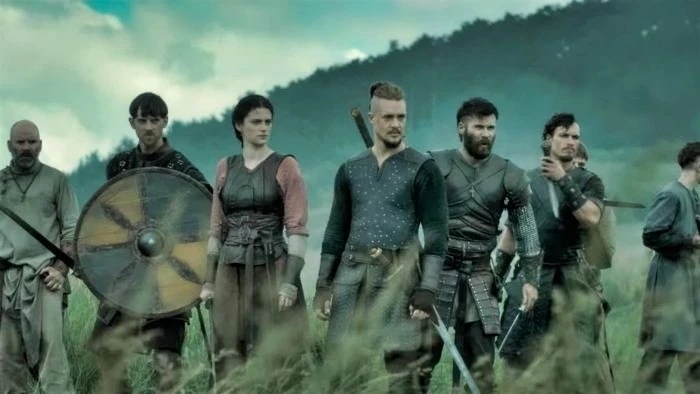
Where Vikings is, as the name suggests, mainly about Viking culture, which really was very unpleasant in many respects, The Last Kingdom is about the clash of cultures and tries to find good in all, even the Vikings. That clash is epitomised in the person of Uhtred, born a Saxon but raised as a Viking - or a Dane as they say in The Last Kingdom, and as the Anglo-Saxons said at the time, since the Kingdom of Denmark also had dominion over southern Norway for much of this period.
The Last Kingdom of the title is initially Wessex, the only Anglo-Saxon Kingdom that did not fall to the Danes, but by the fifth season the situation is reversed and it is Northumbria, the only Kingdom not part of the Wessex hegemony, that has become the Last Kingdom. Although the historical reality was a bit more complicated than that, the point is well made that Alfred the Great turned everything around. One man can make all the difference.
The suggestion in The Last Kingdom is that he had help. Uhtred is the fictional ancestor and namesake of a real life Earl of Northumbria known as Uhtred the Bold, who lived about a hundred years later. Our Uthred is a typical Cornwell hero - an outstanding individual fighter with a broader intelligence than might be expected, who attracts the loyalty of others and is loyal in return, despite a definite insubordinate streak and a tendency to get himself into avoidable trouble when he loses his temper. He has a lot in common with Cornwell's most famous hero, Richard Sharpe, not least in gathering around himself a tight knit band of followers, including an intellectual, an obviously doomed youngster, and a big Irishman who gets all the best lines - one suspects Finan had a descendant named Harper.
Like Sharpe, Uhtred has a prickly relationship with a great historical figure who both favours and exploits him, and relies a lot of the mediation of friendly advisers, who are, in Uhtred's case, men of the cloth. Despite that, Uhtred himself remains defiantly pagan.
It is a weakness that The Last Kingdom shares with Vikings that it does not really explain how and why the conflict between Vikings and Christianity was won by the latter. Cornwell reacted against a very religious upbringing and this is reflected in the negative portrayal of the Church in The Last Kingdom - it seems to be made up largely of greedy Bishops and cowering monks. How could such people have converted the Vikings as history tells us they did? That said, some of the most agreeable characters, all friends of Uhtred, are members of the clergy, the priests Beocca and Pyrlig, and the Abbess Hild, who together put the military into the Church Militant.
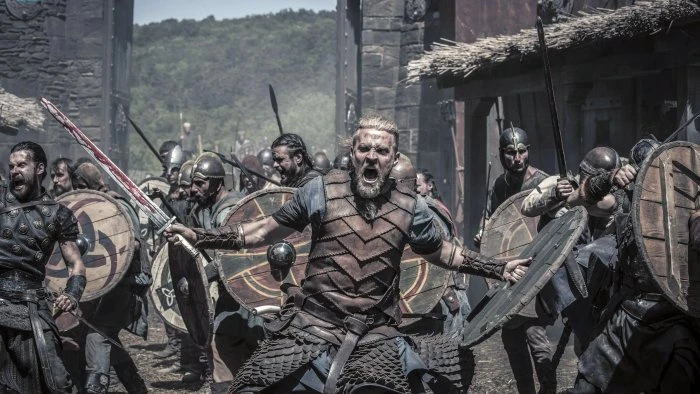
Another weakness is the subtext that Uhtred's internal and external cultural conflicts occasionally seems to be intended to evoke parallels with more modern debates about immigration and integration. The situations are completely different: the Danes were not refugees but violent invaders who had no moral qualms about what would today be called "ethnic cleansing." While there was indeed intermarriage, or at least interbreeding, between conquerors and conquered, it was usually more rape than Romeo and Juliet.
Uhtred himself is really a victim of an extreme form of Stockholm Syndrome. His sympathy for the Danes grows out of his gratitude at being treated with growing kindness by the people who killed his father and brother before desecrating their corpses.
Indeed, there is no attempt to disguise the merciless brutality of the Danes. It is only gradually that we become aware of their human side. Most of the main antagonists are Viking warlords played by Scandinavian actors. Given that there are 13 novels in Cornwell's cycle of 'Saxon Stories,' it is no surprise that there are a lot of them of them, starting with the historical Ubbe - possibly Ubbe Ragnarsson, even if his surname is never mentioned in The Last Kingdom. Some really are no more than the tough, treacherous psychopaths they appear to be. Others evolve or reveal hidden depths. One, the historically significant Guthrum, is a thoughtful man whose exploration of comparative religion leads him from murdering monks to a sincere acceptance of Christianity. Another is torn between his love for his brother and his love for a Saxon Princess. A hard looking youngster guilty of atrocities against Christians is also a self-sacrificing leader of his own people. A self-serving chief becomes something of a loveable rogue who ultimately chooses honour over safety.
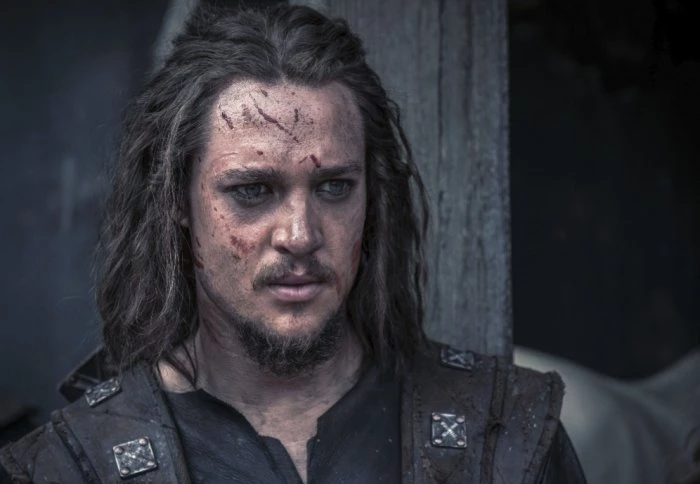
This is all delivered by an outstanding cast. An energetic and engaging leading man, Alexander Dreymon grasps the role of Uhtred with both hands and never lets go. Although he is a sympathetic character in every sense, we also see the impulsiveness and arrogance that gets him into so much needless trouble - and costs the people he loves dear. He is the hero in that he usually does the heroic thing in the end, but on the way he can be as egotistical as any of the villains. In other words he is an interesting, well drawn, and realistic human being.
Some well known names were brought into the earlier episodes to help the show get established, above all the great Rutger Hauer himself as a grandfatherly Dane. Matthew Macfadyen is Uhtred's father. Jason Flemyng is a slightly reluctant Martyr King and Lorcan Cranitch an understandably even more reluctant missionary who, er, help Guthrum on his Spiritual journey. That fine actor Ian Hart stays around longer as Uhtred's own counsellor, Beocca, and does some of his best work, a beautiful portrait of a man who combines faith with a fund of worldly wisdom and who perhaps struggles a little to reconcile the two.
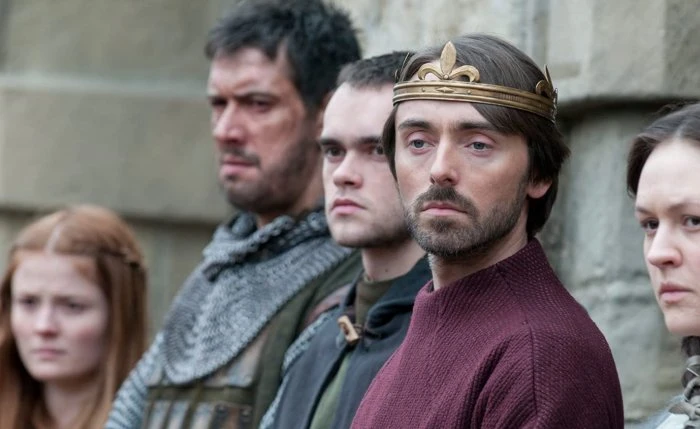
If David Dawson's Alfred is not quite the soldier-scholar of history, he is an interesting character study in his own right. This is a man who is intelligent enough to be aware of his weaknesses and fear them. This awareness is not enough to prevent a series of misunderstandings with Uthred. What neither man can admit is that each needs the other. The conclusion to this friendship which could never call itself a friendship is very powerful.
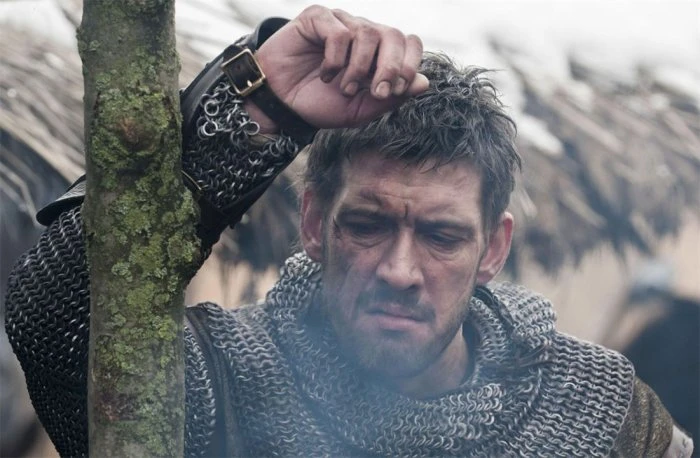
Adrian Bower almost steals the first season as the hardbitten professional warrior Leofric. Thereafter the role of Uhtred's best friend is taken up by the Irishman Finan, who is actually played by a Scotsman, Mark Rowley, evidently channelling Daragh O'Malley from Sharpe.
The Award for Best Actress in The Last Kingdom must surely go to Eliza Butterworth as Alfred's wife, Aelswith, whose hugely satisfying character arc sees her grow from the narrow minded victim of a not very happy marriage into an oddly loveable eccentric grandmother. The runner up is Eva Birthistle as the Abbess Hild, another woman we meet first as a victim who is determined not to let that define her. Emily Cox copes well with the complicated role of Uhtred's first love who is destined for a very different journey: we never quite make up our minds whether we sympathise with her or not, which may be the point.
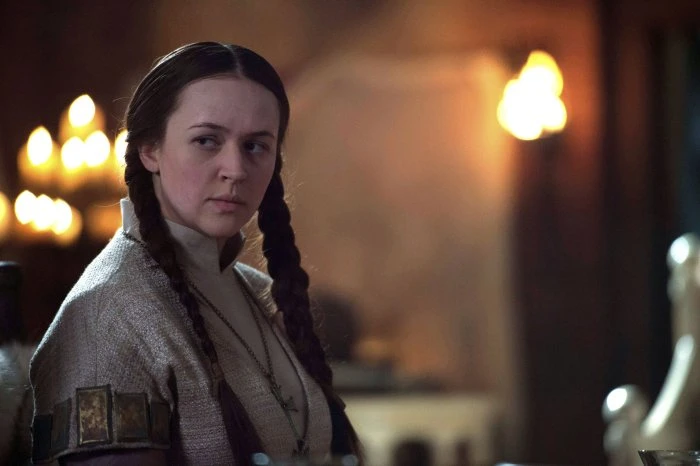
Rune Temte, Peter Gantzler, Thomas Gabrielsson, Jonas Malmsjo, Christian Hillborg, Bjorn Bengtssson, Jeppe Beck Laursen, Ola Rapace, Magnus Bruun, and Eysteinn Sigurdarson provide an apparently never-ending succession of apparently psychotic invaders. At first all their characters come across as they appeared to their Anglo-Saxon opponents, as highly aggressive, ruthless, and thoroughly untrustworthy barbarian chiefs, the important differences between them becoming apparent only as the story develops. There are exceptions to this: Uhtred's foster brother, played by Tobias Santelmann, always seems far too nice to be a Viking warlord and Thure Lindhardt's King Gutred seems far too weak. This is not a negative reflection on the actors. Indeed, the whole Scandinavian side of the cast is very strong - as always seems to be the case these days - with their slight differences of accent and mannerism emphasising the divide between Danes and Anglo-Saxons. It is worth noting that both people's came from more or less the same part of the world, so they would have understood each other as they do in The Last Kingdom without the need for translation.
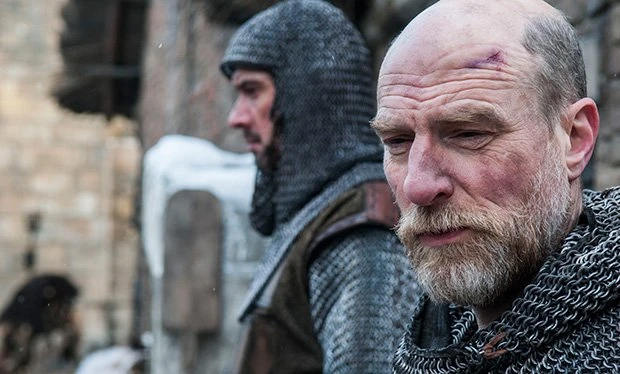
Simon Kunz really looks the part of Odda, Ealdorman or Earl of Devonshire, and Alfred's right-hand man. Adrian Schiller is suitably Machiavellian as the more urbane Ealdorman of Wiltshire. It is typical of the production that the nobler of these two characters has his off days and the ambitious plotter has moments of decency, so we can never be certain which way either will go in the end.
Similarly, the obvious villain Aethelwold, played by Harry McEntire, sometimes looks as if he might just be on a road to redemption - and, since he is rather amusing, we sometimes even hope that he is. At the same time, Alfred's son Edward, played by Timothy Innes, looks as if he is being set up as the handsome young hero only to reveal serious weaknesses when put under pressure.
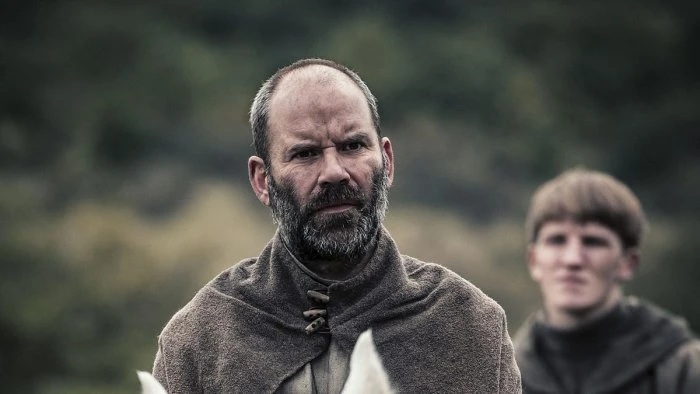
Cavan Clerkin is fun as Pyrlig, the most Cockney Welshman ever. Sonya Cassidy is a sensible noblewoman whose good judgement does not extend to her love life. Adrian Bouchet really looks the part as Alfred's bodyguard Steapa. Familiar faces seen too briefly include Paul Ritter as an impecunious Cornish King, Sean Gilder as a double minded Ealdorman, Richard Dillane as an Ealdorman who dreams of a free Mercia (ideally with himself as King), and David Schofield as a power hungry Abbot. Steffan Rhodri - "Dave Coaches" in Gavin and Stacey - is the Welsh King Hywel Dda: his name means "Howell the Good," and he does at least express mild disapproval of the mistreatment of prisoners and sympathy for the suffering of his people from Danish raids, which makes him very good indeed by 'The Last Kingdom' standards.
Hungary, where the production was based, doubles convincingly for England and Wales: if some of the landscapes seem a bit too Central European, it should be remembered that Britain was far more forested in the 10th Century than today, so they might not as far out as they sometimes appear. The only problem with filming in Hungary is a lack of coastline, so some of the location work was also done in Durham, Northumberland, and North Wales.
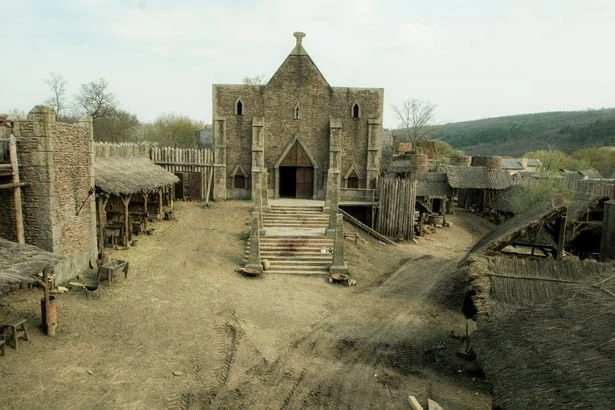
The principal location was at the Medieval Village Set at Korda Studios near Budapest. Much of the architecture is anachronistic: Alfred probably slept in a wooden hall rather than a stone palace. While some of the Romanesque buildings could be excused by the possibility that the Anglo-Saxons might have adapted Roman remains, we have the word of the Venerable Bede, among others, that they preferred to avoid them.
Similarly, much of the military technology references a much later, or earlier, period: if the Anglo-Saxon Kings had standing armies of highly disciplined infantry in uniform full armour the result of the Battle of Hastings would have been very different.
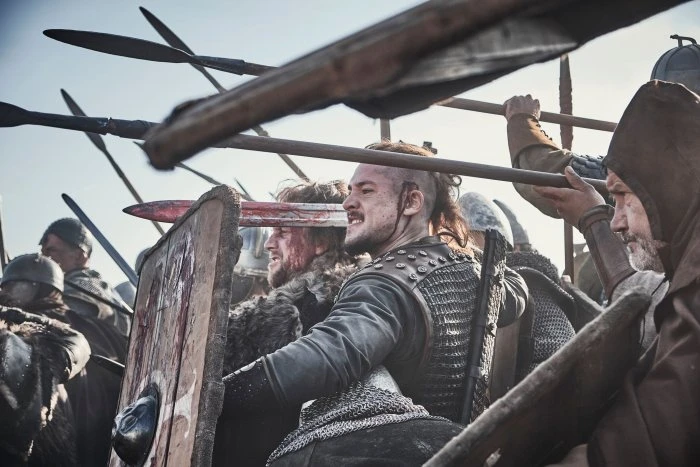
That said, the battle scenes are superb. One gets a real sense of the effectiveness of the shield wall as a tactic, and why it was so difficult to breach: Uhtred succeeds in doing so on one occasion only because he is provoked into a mental state in which he cares nothing for his own life - it was basically a suicide mission that he happened to survive. One also sees how battles usually came down to giant rugby mauls, illustrated perfectly in the final episode.
The fight choreography in general is of a very high standard, from the epic set pieces through countless skirmishes down to some well staged duels where the result seems in doubt even when one knows the hero must survive. Dreymon makes a virtue of his lack of the physical bulk that Uhtred had in the books, and probably in history, and the confident fluidity of his movement suggests his Uhtred would indeed be a dangerous opponent.
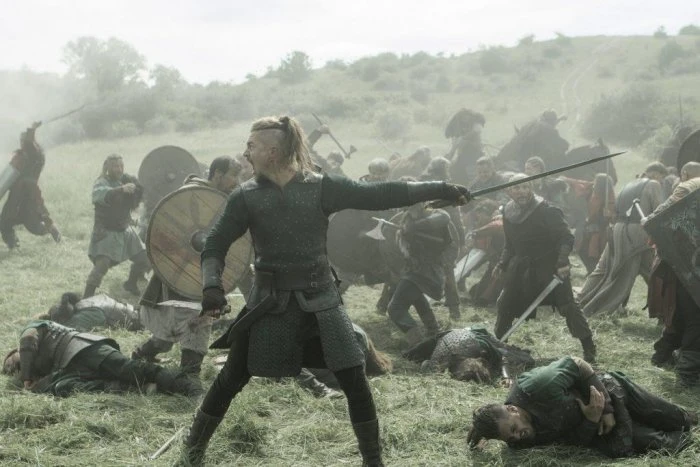
Indeed, the production values are excellent in almost every department. Even as one quibbles about the historical accuracy of some of the details of wardrobe and sets, one cannot deny that the whole thing looks how Anglo-Saxon England should look and that is all is really all that is required.
A particular nod of appreciation is due to the makeup department for their discreet ageing of the characters over a period of about a generation - the exact chronology seems to be kept deliberately vague. There are changes, indicating the maturing of the characters emotionally as well as physically, but they are so unobtrusive as not to be distracting, which is the essence of all good make up.
The project marked a definite return to form in historical drama by the BBC, but it was Netflix who picked up the ball and ran with it. Although there is still a lot of material in Cornwell's cycle of 'Saxon Stories' that could yet be adapted, Netflix made the correct decision to wind up when the story reached a natural conclusion, avoiding the mistake made by Vikings in this regard. However, they have commissioned a free-standing feature length film, Seven Kings Must Die to conclude Uhtred's story. Since such feature length conclusions are rarely wholly satisfactory, one cannot help fearing that might be wiser to leave Uhtred where he is.
If they stopped there, The Last Kingdom would probably remain a text book example of how to do the adaptation of historical fiction well.
Seen this show? How do you rate it?
Seen this show? How do you rate it?
Published on April 15th, 2022. Written by John Winterson Richards for Television Heaven.


